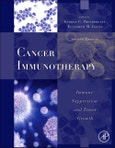There has been major growth in understanding immune suppression mechanisms and its relationship to cancer progression and therapy. This book highlights emerging new principles of immune suppression that drive cancer, and it offers radically new ideas about how therapy can be improved by attacking these principles. Following work that firmly establishes immune escape as an essential trait of cancer, recent studies have now defined specific mechanisms of tumor immune suppression. It also demonstrates how attacking tumors with molecular targeted therapeutics or traditional chemotherapeutic drugs can produce potent anti-tumor effects in preclinical models. This book provides basic, translational, and clinical cancer researchers with an indispensable overview of immune escape as a critical trait in cancer and how applying specific combinations of immunotherapy and chemotherapy to attack this trait may radically improve the treatment of advanced disease.
Please Note: This is an On Demand product, delivery may take up to 11 working days after payment has been received.
Table of Contents
Part I: Principles of Cancer ImmunobiologyIntroduction
Cancer Immunoediting: From Immune Surveillance to Immune Escape
Immunosurveillance: Innate and Adaptive Anti-Tumor Immunity
Cytokine Regulation of Immune Tolerance to Tumors
Immunological Sculpting: Natural Killer Cell Receptors and Ligands
Immune Escape: Immunosuppressive Networks
Part II: Cancer Therapeutics
Cytotoxic Chemotherapy in Clinical Treatment of Cancer
Targeted Therapeutics in Cancer Treatment
Concepts in Pharmacology and Toxicology
Cancer Immunotherapy: Challenges and Opportunities
Cancer Vaccines
Part III: Targets and Tactics to Improve Cancer Immunotherapy By Defeating Immune Suppression
Immunotherapy and Cancer Therapeutics: Why Partner?
Immune Stimulatory Features of Classical Chemotherapy
Dendritic Cells and Co-Inhibitory Molecules
Regulatory T Cells in Tumor Immunity: Role of Toll-like Receptors
Tumor-associated Macrophages in Cancer Growth and Progression
Tumor-associated Myeloid-derived Suppressor Cells
Programmed Death Ligand-1 and Galectin-1: Pieces in the Puzzle of Tumor Immune Escape
IDO in Immune Escape: Regulation and Therapeutic Inhibition
Arginase, Nitric Oxide Synthase, and Novel Inhibitors of L-arginine Metabolism in Immune Modulation
Summary: Future Questions








